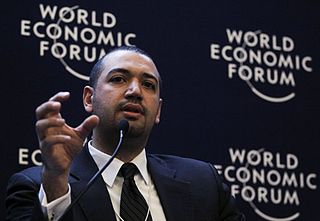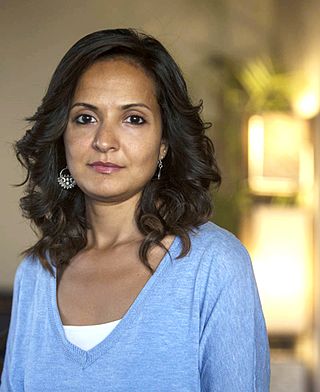
Mohamed Salah al-Din al-Halim Zaidan, commonly known by his nom de guerreSaif al-Adel, is a former Egyptian Army officer and explosives expert who is widely understood to be the de facto leader of al-Qaeda. Al-Adel fought the Soviets as an Afghan Arab before becoming a founding member of the al-Qaeda organization. He is a member of Al-Qaeda's Majlis al-Shura and has headed the organization's military committee since the death of Muhammad Atef in 2001. He is currently known to live in Iran along with several other senior members of the group.
Yosri Fouda, is an Egyptian investigative reporter, author, and television host. He established Al Jazeera's office in London and was one of the star figures in the channel until he resigned in 2009. Fouda also worked as a television host at the Cairo-based ONTV Egyptian Channel. He co‑authored Masterminds of Terror: The Truth Behind the Most Devastating Attack The World Has Ever Seen, published in 2003 by Arcade Publishing.
Contextual objectivity is a principle with roots in quantum mechanics that was adapted and applied to explain and describe the operations of news media organizations during times of war. Proposed by Adel Iskandar and Mohammed El-Nawawy in their analysis of Al-Jazeera as a case study, the term expresses the attempt "to reflect all sides of any story while retaining the values, beliefs and sentiments of the target audience". The concept has been applied by some scholars to explain Fox News Channel's news programming in the 2002–2003 run-up to the Iraq War. Other studies used contextual objectivity to describe differences between mainstream media and alternative ethnic media's coverage of post-Hurricane Katrina relief efforts.

Moez Masoud is an Egyptian scholar, public intellectual and international producer who focuses on the fields of existential questions, challenges to global co-existence, and identity in the modern world.
Mustafa Hamid, also known as Abu Walid al-Masri and Hashim al-Makki, is a journalist who in the 1980s fought as an Islamic jihad volunteer during the Soviet–Afghan War. He is reported to have been an al-Qaeda advisor and taught at the Al Farouq training camp in the 1990s. He served as a bureau chief in Afghanistan for Al Jazeera from 1998 to 2001, before leaving for Iran.

Al Jazeera Media Network is a private-media conglomerate headquartered at Wadi Al Sail, Doha, funded in part by the government of Qatar. The network's flagship channels include Al Jazeera Arabic and Al Jazeera English, which provide coverage of regional and international news, along with analysis, documentaries, and talk shows. In addition to its television channels, Al Jazeera has expanded its digital presence with platforms such as AJ+, catering to younger audiences with formats and content tailored for online consumption. Al Jazeera broadcasts in over 150 countries and territories, and has a large global audience of over 430 million people.

The 2011 Egyptian revolution, also known as the 25 January Revolution, began on 25 January 2011 and spread across Egypt. The date was set by various youth groups to coincide with the annual Egyptian "Police holiday" as a statement against increasing police brutality during the last few years of Hosni Mubarak's presidency. It consisted of demonstrations, marches, occupations of plazas, non-violent civil resistance, acts of civil disobedience and strikes. Millions of protesters from a range of socio-economic and religious backgrounds demanded the overthrow of Egyptian President Hosni Mubarak. Violent clashes between security forces and protesters resulted in at least 846 people killed and over 6,000 injured. Protesters retaliated by burning over 90 police stations across the country.

The Arab Spring or the First Arab Spring was a series of anti-government protests, uprisings and armed rebellions that spread across much of the Arab world in the early 2010s. It began in Tunisia in response to corruption and economic stagnation. From Tunisia, the protests then spread to five other countries: Libya, Egypt, Yemen, Syria and Bahrain. Rulers were deposed or major uprisings and social violence occurred including riots, civil wars, or insurgencies. Sustained street demonstrations took place in Morocco, Iraq, Algeria, Lebanon, Jordan, Kuwait, Oman and Sudan. Minor protests took place in Djibouti, Mauritania, Palestine, Saudi Arabia and the Moroccan-occupied Western Sahara. A major slogan of the demonstrators in the Arab world is ash-shaʻb yurīd isqāṭ an-niẓām!.

Ahmed Maher is one of the co-founders of the April 6 Youth Movement, and a prominent participant in the Egyptian revolution of 2011 demonstrations in Egypt in 2011. He is a civil engineer who works for a construction firm in New Cairo.

Ash-shaʻb yurīd isqāṭ an-niẓām is a political slogan associated with the Arab Spring. The slogan first emerged during the Tunisian Revolution. The chant echoed at Avenue Habib Bourguiba in Tunis for weeks. The slogan also became used frequently during the 2011 Egyptian revolution. It was the most frequent slogan, both in graffiti and in chants in rallies, during the revolution in Egypt.
Hamdeen Sabahi is an Egyptian politician and journalist. He is a former presidential candidate and currently the leader of the Egyptian Popular Current and a co-leader of the National Salvation Front.

Courtney C. Radsch is an American journalist, author and advocate for freedom of expression. She is the author of Cyberactivism and Citizen Journalism in Egypt: Digital Dissidence and Political Change and worked as the advocacy director for the Committee to Protect Journalists until 2021. She has written and been interviewed extensively about digital activism and social media in the Middle East since 2006.
Jadaliyya ("dialectic") is an independent ezine founded in 2010 by the Arab Studies Institute (ASI) to cover the Arab World and the broader Middle East. It publishes articles in Arabic, French, English and Turkish, and is run primarily on a volunteer basis by an editorial team, and an expanding pool of contributors that includes academics, journalists, activists and artists.

Elaph is the first daily Arabic independent online newspaper and is not associated with any established print or broadcast medium.

Al Mayadeen is a Lebanese pan-Arabist satellite news television channel based in the city of Beirut. Launched on 11 June 2012, it has news reporters in most of the Arab countries. In the pan-Arabist television news market, it competes against Qatar-owned Al Jazeera and Saudi-owned Al Arabiya, and also against Sky News Arabia and BBC News Arabic. At the time it was founded, most of the channel's senior staff were former correspondents and editors of Al Jazeera.
The Al Jazeera effect is a term used in political science and media studies to describe the impact of new media and media sources on global politics, namely, reducing the government and mainstream media monopoly on information and empowering groups which previously lacked a global voice. The primary example is the effect's namesake – the impact of the Al Jazeera Media Network on the politics of the Arab world.
Shereen El Feki is a British journalist and author, most notable for her book Sex and the Citadel: Intimate Life in a Changing Arab World.

Rawya Rageh is an Egyptian journalist and Senior Crisis Adviser for Amnesty International based in New York City. She was previously a broadcast journalist known for her in-depth coverage of notable stories across the Middle East and Africa, including the Iraq War, the Darfur crisis in Sudan, the Saddam Hussein trial, the Arab Spring, and the Boko Haram conflict in Northern Nigeria. Working as a correspondent for the Al Jazeera English network her contribution to the Peabody Award-winning coverage the network provided of the Egyptian Revolution of 2011 and the Arab Spring was documented in the books 18 Days: Al Jazeera English and the Egyptian Revolution and Liberation Square: Inside the Egyptian Revolution and the Rebirth of a Nation. The news story she broadcast on 25 January, the first day of the Egyptian Revolution of 2011, was selected by Columbia University Graduate School of Journalism as one of the "50 Great Stories" produced by its alumni in the past 100 years. In addition to her broadcast reporting, Rageh is an active social media journalist, recognized by the Washington Post as one of "The 23 Accounts You Must Follow to Understand Egypt" and by Forbes Middle East Magazine as one of the "100 Arab personalities with the most presence on Twitter."
Al Jazeera Arabic is a Qatari state-owned Arabic-language news television network. It is based in Doha and operated by the Al Jazeera Media Network, which also operates Al Jazeera English. It is the largest news network in the Middle East and North Africa region. It was founded in 1996 by the then Emir of Qatar Sheikh Hamad bin Khalifa Al Thani.
Ian James Lee is an American journalist based in Britain for CBS News. Prior to working for CBS, he worked for CNN, and, before that, Lee was also the multimedia editor at the Daily News Egypt from 2009 to 2011. During that time, he also was a freelance video journalist for Time Magazine and spent a year as a package producer for Reuters. Lee has covered the 2011 Arab Spring, Euromaidan, Sochi Winter Olympics, 2013 Egyptian coup d'état in Egypt, 2014 Gaza War, 2016 Turkish coup d'état attempt, and 2017 North Korea crisis, among other things.










